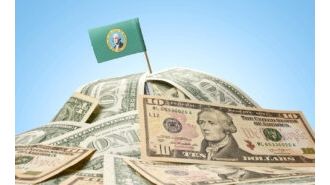Macron casts his vote in important election that may result in far-right gaining control.
Voting underway in France's key runoff elections, with potential victory for far-right National Rally's Le Pen.

As the sun rose over mainland France, the nation braced itself for a pivotal day of voting in the runoff elections. The outcome of these elections could have far-reaching consequences, potentially leading to a historic victory for Marine Le Pen's far-right National Rally or a hung parliament and political deadlock.
The stakes were high for French President Emmanuel Macron, who took a bold risk by dissolving parliament and calling for these elections after his centrists suffered a crushing defeat in the European elections on June 9th.
These snap elections would not only determine control of the influential lower house of parliament, but also have a significant impact on international affairs such as the war in Ukraine and Europe's economic stability. It was almost certain that the results would also weaken Macron's presidency for the remaining three years of his term.
The first round of voting on June 30th saw the National Rally, led by Marine Le Pen, make unprecedented gains with their anti-immigration and nationalist platform. With over 49 million registered voters, the nation awaited to see who would control the 577-member National Assembly and ultimately, who would become the prime minister.
If Macron's already weak centrist majority was further eroded, he would be forced to share power with parties that opposed his pro-business and pro-European Union policies. The voters were acutely aware of the consequences of their decision, with many expressing their concerns about individual freedoms, tolerance, and respect for others.
However, the campaign leading up to these elections was marred by incidents of racism, anti-Semitism, and even Russian cyber campaigns. This heightened tension was reflected in the government's decision to deploy 30,000 police officers on voting day.
These elections took place during a special summer for France, with the country preparing to host the Olympics, its national football team making it to the semi-finals of the Euro 2024 championship, and the Tour de France being held alongside the Olympic torch.
As the clock struck noon, the voter turnout was slightly higher than the first round last Sunday, with 26.63% of eligible voters casting their ballots. This was a significant improvement from the past three decades, where voter apathy had been on the rise. It was a reminder that voting in France is not compulsory.
Both the Prime Minister, Gabriel Attal, and Macron himself cast their votes in the morning. Le Pen, on the other hand, did not vote as her district had already held its second round of voting.
The results of these elections were highly uncertain, with polls predicting a win for the National Rally but falling short of an absolute majority. This would make history, as the party with ties to xenophobia and Holocaust denial would become the biggest political force in France.
If this were to happen, Macron would be forced to share power with a prime minister who opposed his policies, a situation known as "cohabitation" in France. Another possibility was a hung parliament, which could lead to coalition negotiations or the formation of a technocratic government.
Regardless of the outcome, Macron has insisted that he will not step down and will continue as president until his term ends in 2027. However, the results of these elections would undoubtedly have a significant impact on his presidency and the future of France.
Many voters, especially in rural areas, have become disillusioned with the Paris political elite and their perceived lack of concern for the struggles of the working class. This sentiment has been capitalized on by the National Rally, who have gained support by blaming immigration for France's problems.
Le Pen has worked to soften the party's image and make it more electable, but their core far-right values remain. They have proposed controversial policies such as a citizenship referendum and giving more power to the police.
As the day came to a close, the nation awaited the final results, which were expected late on Sunday or early Monday. These elections had the potential to change the course of French politics, and many voters were worried about what the future held. As 55-year-old legal expert Valerie Dodeman put it, no matter what the outcome, these elections would leave people disgruntled on all sides.










